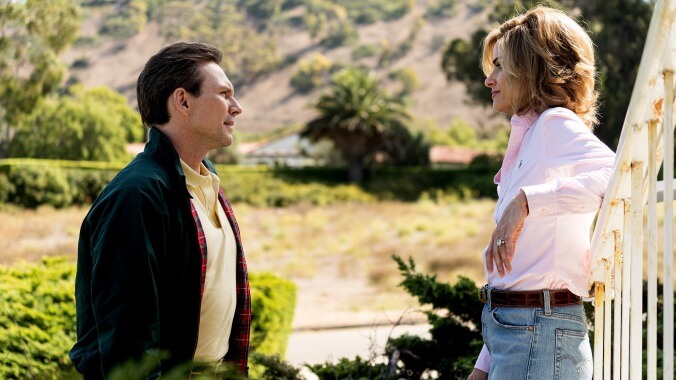If you’ve heard of Betty Broderick at all, it’s likely as the ultimate illustration of the adage “Hell hath no fury like a woman scorned.” In the 1980s, Broderick’s marriage ended when the father of her four kids dumped her for a younger woman—a tale as old as time. But Broderick responded by smashing her car into her ex-husband’s home (while their kids were inside), leaving hours of profanity-filled messages on his answering machine, and, ultimately, killing him and his new bride. Betty Broderick is still in prison; the last time she was denied parole in 2017, the deputy district attorney called her “unrepentant,” adding that Broderick had “no remorse and zero insight” into the murders she committed.
The case was made even more infamous by a pair of 1992 TV movies that earned Meredith Baxter an Emmy nomination: A Woman Scorned: The Betty Broderick Story and Her Final Fury: Betty Broderick, The Last Chapter. Nearly three decades later, the Brodericks’ story is getting a new dramatic interpretation with an award-worthy star turn of its own.
How does a beautiful, well-off wife and mother, a pillar of Southern California society, devolve into a mentally unstable convicted murderer? To explain this tragic transformation, Amanda Peet doesn’t portray Betty as much as she embodies her. It’s an astonishing performance: so painful at times that it’s difficult to witness—yet so compelling, it’s impossible to look away.
As with Dirty John’s first season, the focus here is on the woman as wronged victim, despite the fact that it’s Dan Broderick (Christian Slater) who winds up dead in the end. Firmly on Betty’s side, the eight-episode series shows the pair’s early years, where Betty sacrifices for her husband by working menial jobs (often while pregnant), while he attends medical school at Cornell and then Harvard Law. Riverdale’s Tiera Skovbye ably portrays sympathetic bridal Betty, while Chris Mason does an spot-on Christian Slater impersonation as young Dan. (There’s something poetic about the fact that Slater made his first big splash as a teenager doing a Jack Nicholson impression in Heathers, and now he’s sharing a character with a younger actor who looks a lot like a young Jack Nicholson.)
You know Dan Broderick is going to be a shitheel when he cancels maid service on the pair’s honeymoon for privacy, blithely informing his wife that she’ll be making the bed. She types up all his college papers and legal briefs without complaint, dutifully heats up leftovers when he murmurs that he’s hungry, and is the first to suggest that he open his own law firm focusing on medical malpractice, a move that eventually makes him a millionaire. (Cyndi Lauper’s “Money Changes Everything” isn’t exactly a subtle needle drop here, but it gets the point across.)
Slater, for his part, delivers a perfect cocktail of arrogant smarm mixed with the charm that comes with an overblown sense of self-confidence, right down to his Izod polo shirts. As Betty unravels further and further, Dan also has the advantage of seeming the more reasonable of the pair. But Slater wisely concedes the spotlight to his co-star, who fights for every moment: Peet’s Betty transforms from glorious golden socialite to unrecognizable criminal without a shred of vanity by the end. Sure, she’s lost custody of her kids, her husband, her home, her social status. Her unwavering focus on how Dan’s treatment of her has wrecked her life eventually alienates her from her children and the few friends she has left, in a heartbreaking series of descending steps. But wives get left every day—Betty’s friend’s ex-husband also remarries a younger woman. What turned the Broderick story into the ultimate tragedy?
The series’ best episode (in a string of standouts) brings Jeff Perry (Scandal’s Cyrus) to the witness stand as a relationship expert who specializes in infidelity. What led Betty to lose her grasp on reality, he points out, was likely the gaslighting by her husband. As the pair had been married for 16 years, Betty knows something’s up as soon as Dan starts mentioning a new young employee at the office (Legion’s Rachel Keller as Linda). But for two years, he brushes off Betty’s (spot-on) accusations, leading her to doubt her very reality and ultimately, costing her her sanity. The kindest thing post-divorce Dan does for Betty is admit that she was right the entire time; Betty practically cheers, so relieved she is to discover that she wasn’t just being paranoid, but the mental damage has already been done. Left almost completely alone with nothing to do but focus on the shattered ruins of her life, Peet’s Betty transforms into the darkest shadow of the popular hostess we once saw effortlessly serving her own homemade cocktails—now almost entirely supine except when she sits up to scrawl hurtful messages into a bile-filled diary.
At times, though, Betty is her own worst enemy, and it’s painful to watch as she fires the lawyers who are trying to help her, squanders valuable time with her children by complaining about their father, and is unable to stop making those damaging phone calls. The fact that she does a passable job of defending herself in court, as Peet steels her (heavily padded) shoulders, offers a glimmer of the competent, independent woman Betty could have been. The most effective part of Peet’s performance is how domestically relatable it is: It’s terrifying to see how quickly Betty’s persona dissolves into a vindictive character with nothing else in her mind but revenge.
It’s so relatable, in fact, we can’t help but ask ourselves: What if our lives were turned upside down? What if we lost everything? If we’re strong enough, hopefully we would be able to rebuild. But Betty Broderick, after years with a controlling husband who diminished her role in their partnership and then just dismissed her outright, went in the other direction, sinking deeper and deeper into a depression that turned deadly. The tragic consequences of Betty and Dan’s story hangs over Dirty John: The Betty Broderick Story from the beginning, elevating the series from a possible Lifetime knockoff to a realistic and unforgettable portrayal of mental breakdown, casting Amanda Peet in a new dramatic light.










































